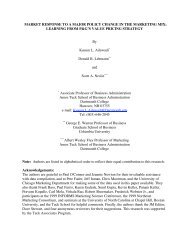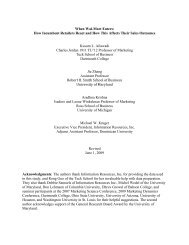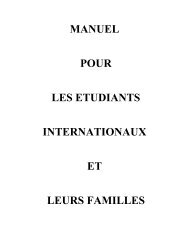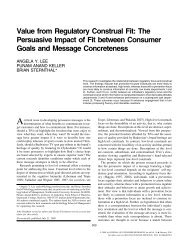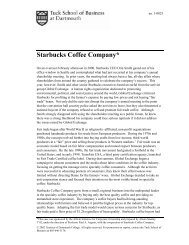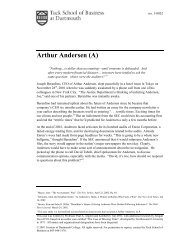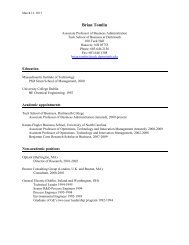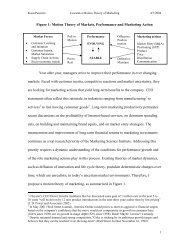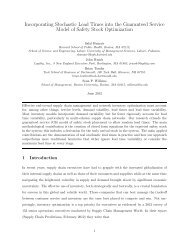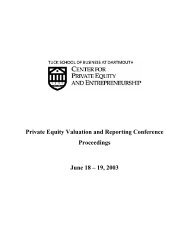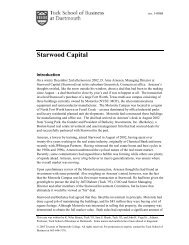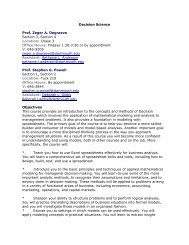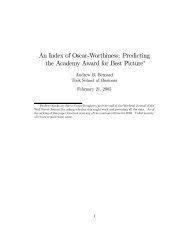tax notes international - Tuck School of Business - Dartmouth College
tax notes international - Tuck School of Business - Dartmouth College
tax notes international - Tuck School of Business - Dartmouth College
You also want an ePaper? Increase the reach of your titles
YUMPU automatically turns print PDFs into web optimized ePapers that Google loves.
Internal Revenue Code section 894(c) and Treas.<br />
reg. section 1.894-1(d) deal with this issue in cases<br />
when the United States is the source country. An investor<br />
can claim benefits <strong>of</strong> the U.S./investor-country<br />
treaty on the investor’s share <strong>of</strong> the fund’s income if<br />
the fund is fiscally transparent in the investor country<br />
and the investor is not fiscally transparent in the investor<br />
country. The analysis in other countries can be different,<br />
or unclear.<br />
The CIV report is limited in scope to funds that are<br />
both widely held and subject to investor protection<br />
regulations, that is, are under the Investment Company<br />
Act <strong>of</strong> 1940 in the United States, or the UCITS Directive<br />
in the EU. It does not address the usual type <strong>of</strong><br />
hedge fund or private equity fund.<br />
The report concludes that under existing treaties, a<br />
fund that does not have legal personality under domestic<br />
law, such as a fond commun de placement, most likely<br />
is not a person for treaty purposes and therefore cannot<br />
claim benefits under the source-country/fund-country<br />
treaty in its own right. On the other hand, a fund organized<br />
as a corporation or a trust should be regarded<br />
as a person for treaty purposes, the report says.<br />
It concludes that a fund that receives an exemption<br />
for specific types <strong>of</strong> income should be viewed as subject<br />
to <strong>tax</strong> for treaty purposes, as should a fund that<br />
receives a deduction for dividends paid (as is the case<br />
with U.S. mutual funds). But a fund that is fiscally<br />
transparent (treated like a partnership) in the fund<br />
country or is exempt from fund-country <strong>tax</strong> on all <strong>of</strong><br />
its income should not be subject to <strong>tax</strong> in the fund<br />
country.<br />
The majority view in the report, though not without<br />
dissent, is that a fund that is a resident should be<br />
viewed as the beneficial owner <strong>of</strong> its income for treaty<br />
purposes. In any event, it is important that source<br />
countries clarify their views as to whether CIVs are<br />
entitled to benefits under current treaties.<br />
The ICG also considered situations under existing<br />
treaties in which a fund cannot claim benefits under<br />
the source-country/fund-country treaty in its own right.<br />
In those cases, the report concludes that in principle,<br />
investors should be able to claim treaty benefits on<br />
their share <strong>of</strong> the fund’s income under the sourcecountry/investor-country<br />
treaties.<br />
This approach — investor-level benefits under the<br />
source-country/investor-country treaties — was viewed<br />
as less desirable than fund-level benefits because <strong>of</strong> the<br />
difficulty <strong>of</strong> allocating the fund’s income among the<br />
investors in a widely held fund with investors coming<br />
and going daily. It was also recognized that many investors<br />
would not bother to file requests for relief under<br />
the source-country/investor-country treaties for<br />
small amounts <strong>of</strong> money. Thus, it was argued in these<br />
cases that the fund should be able to file claims for<br />
relief under the source-country/investor-country treaties<br />
on behalf <strong>of</strong> the investors. However, a minority <strong>of</strong><br />
OECD<br />
the ICG did not believe that investors resident outside<br />
<strong>of</strong> the fund country should be able to claim treaty benefits<br />
under the applicable source-country/investorcountry<br />
treaty. This view would allow investor-level<br />
claims only to residents <strong>of</strong> the fund country.<br />
The CIV report suggests that future treaties should<br />
address the issues raised by CIVs directly, and contains<br />
draft language for revisions to the commentary to the<br />
OECD model income <strong>tax</strong> treaty. The preferred approach<br />
is that a fund should always be a treaty beneficiary<br />
in its own right, although perhaps with relief cut<br />
back proportionately to the extent that the investors are<br />
not themselves entitled to benefits under a sourcecountry/investor-country<br />
treaty with benefits comparable<br />
to the source-country/fund-country treaty.<br />
For example, if the fund was 80 percent owned by<br />
treaty-protected investors and 20 percent owned by<br />
non-treaty-protected investors, one might limit benefits<br />
under the source-country/fund-country treaty to 80<br />
percent <strong>of</strong> the fund’s income. (The issues regarding<br />
how such a fund is to ascertain who owns it are discussed<br />
in the procedures report.)<br />
The ICG felt that allowing funds to claim treaty<br />
benefits under the source-country/fund-country treaty<br />
for the future is preferable to allowing an investor to<br />
claim treaty benefits under the source-country/investorcountry<br />
treaty on the investor’s share <strong>of</strong> the fund’s income.<br />
But the latter alternative might be preferable if,<br />
for example, a substantial number <strong>of</strong> investors in the<br />
investor country are pension funds that are entitled to<br />
special treaty benefits not available to ordinary investors.<br />
This would allow pension funds to claim their<br />
special treaty rates on their share <strong>of</strong> the fund’s income,<br />
albeit at the cost <strong>of</strong> more complexity.<br />
The Procedures Report<br />
Under modern securities processing, interests in a<br />
fund or any widely held or publicly traded security<br />
might be owned through multiple levels <strong>of</strong> brokers,<br />
banks, and other financial intermediaries. For example,<br />
the investor <strong>of</strong> record might be a central securities depository<br />
such as the Depository Trust Company in the<br />
United States or Clearstream or Euroclear in Europe.<br />
The depository holds investments for the account <strong>of</strong><br />
its participants, which typically are banks and brokerages.<br />
The banks and brokerages in turn hold investments<br />
on account <strong>of</strong> their customers, typically through<br />
omnibus accounts that combine securities held on behalf<br />
<strong>of</strong> multiple customers.<br />
This system exists for reasons that have nothing to<br />
do with <strong>tax</strong>. But as a result, the payers in the source<br />
country might have no idea who the ultimate owners<br />
<strong>of</strong> the income that they are paying are, and a fund<br />
might not know who owns it. Obtaining this information<br />
can be very difficult. This can be even more<br />
troublesome if some <strong>of</strong> the intermediaries are subject<br />
to bank secrecy rules.<br />
TAX NOTES INTERNATIONAL FEBRUARY 2, 2009 • 403<br />
(C) Tax Analysts 2009. All rights reserved. Tax Analysts does not claim copyright in any public domain or third party content.



